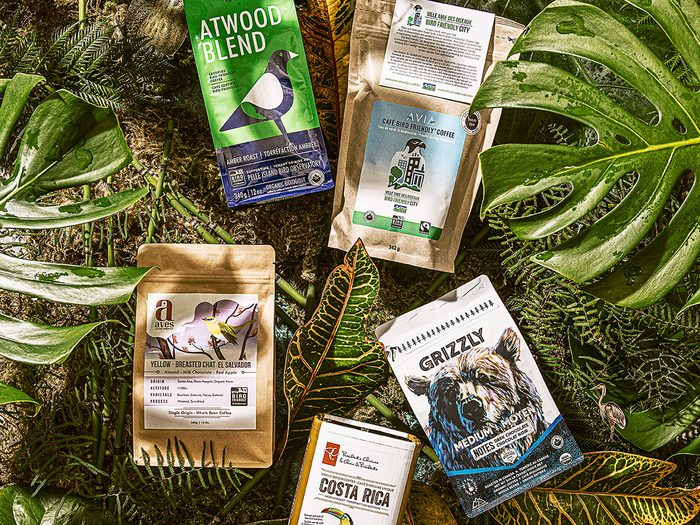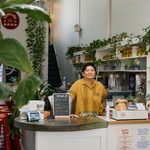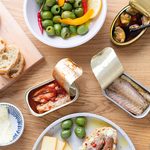Your Easy Guide to Coffee Ecolabels for a Sustainable Cup of Joe

We've defined a few common ecolabels and rounded up five of our favourite sustainable coffee brands available in Canada.
Shopping for coffee can be a daunting task. Most of us just want something tasty that perks us up on dark winter mornings, but not only are you picking between roasts, flavours, brands and format (whole bean vs. pre-ground, the eternal question), there are also ecological considerations. Because coffee is one of the biggest tradable commodities in the world, the environmental footprint is massive, and how it’s farmed really matters. This is why deciphering ecolabels is important.
Coffea arabica, one of the main (and original) species of coffee cultivated, is native to Ethiopia, and has typically been grown within rainforests, shaded by the tree canopy. More recently, however, farmers worldwide have switched over to cultivating species that can be grown in the sun, like Coffea canephora, or robusta. These varieties are more resistant to crop-killing diseases and produce more coffee. It has been estimated that about three-quarters of the world’s coffee is no longer shade-grown. More than 2.5 million acres of forest have been permanently cleared in Central America to make way for coffee farms, contributing to deforestation. This causes soil erosion, threatens biodiversity and tropical forest animal habitats and contributes to climate change.
To pick products that are sustainably and ethically sourced, look for coffee brands with ecolabels on their packaging. Sometimes, consumers are rightfully skeptical of companies’ self-declared claims, but ecolabels really do help us verify before we buy. Also called standards or certifications, an ecolabel “is a visible sign from some independent organization that a particular coffee producer or batch of coffee has followed an independently created set of rules or standards that are designed to reduce their environmental impact,” says Hamish van der Ven, an assistant professor of sustainable business management of natural resources at the University of British Columbia.
Of course, ecolabels aren’t perfect. There is such a large amount of coffee grown around the world, and operations can span continents and oceans (like a Canadian roaster sourcing beans from Ethiopia), that sometimes it’s impossible for auditors to spot everything.
At the end of the day, however, “looking for a third-party certification is still better than no certification,” says van der Ven.
Here are a few commonly found ecolabels and what they mean.
Bird Friendly certifies beans that are both organic and shade-grown. This certification ensures that coffee is farmed in such a way that the foliage cover, tree height and biodiversity in the target area create a quality habitat for migratory birds and other wildlife. This is super important for Canada, since many species of birds that breed in Canada (and consume insects, helping Canadian trees produce oxygen and absorb carbon) have also been observed at these shade-grown coffee plantations.
Fairtrade ensures that the coffee farmers and workers have decent working conditions and are paid fairly for their labour. Small-scale farmers, which Fairtrade (the organization that gives out Fairtrade certifications) says they protect, are bearing the brunt of climate change because of where they live and their role in global coffee trade. Fairtrade also promotes sustainable growing techniques (like planting shade trees and collecting rainwater to reuse).
Canada Organic certifies coffee grown without synthetic pesticides and fertilizers, which decrease soil biodiversity and destabilize local ecology. Instead, organic farmers promote soil fertility and manage weeds, pests and diseases using biological and mechanical methods such as rotating crops, composting and introducing beneficial, pest-eating insects.
Rainforest Alliance is one of the most common ecolabels you’ll see, and certifies farms that follow their sustainable agricultural standards, but some experts believe its criteria are not stringent enough. (Farms must maintain and increase the diversity of natural vegetation and take steps to support the ecosystem, and farms that have destroyed natural ecosystems since 2014 cannot be certified.)
Shop Our Picks:
Canadian Heritage Roasting Company Grizzly
This whole bean medium roast has rich dark chocolate notes and is certified Canada Organic as well as USDA Organic. Eco-bonus: for every bag soldRoasting plants a tree on Canadian soil.
$18 for 340g, calgaryheritageroastingco.com
Aves Yellow-breasted Chat
Aves is an Oshawa, Ont.-based company that prioritizes Bird Friendly coffees with appropriately named blends. Their Yellow-breasted Chat whole bean coffee comes from a farm in El Salvador that also carries the Rainforest Alliance certification.
$19 for 340g, avescoffeeco.com
Balzac’s Atwood Blend
The Atwood blend, named after the iconic Canadian writer, is a certified Canada Organic and Bird Friendly blend with notes of caramel and cocoa. Balzac’s also donates a dollar of each pound of this coffee sold to the Pelee Island Bird Observatory in southern Ontario, which is devoted to the study and conservation of migratory birds.
$17 for 340g, shop.balzacs.com
President’s Choice Costa Rica
This medium roast has a sweet aroma and balanced body and acidity. Grown in Costa Rica’s tropical rainforest, this coffee is Rainforest Alliance certified. Plus, it comes in recyclable containers.
$8 for 340g, loblaws.ca
Café Avia Bird Friendly
Based in Québec, Café Avia’s Bird Friendly coffee contains 100 percent Bird Friendly, Canada Organic and Fairtrade coffee. Each purchase supports Nature Canada’s Bird Friendly City program.
$17 for 342g, cafebirdfriendly.org




